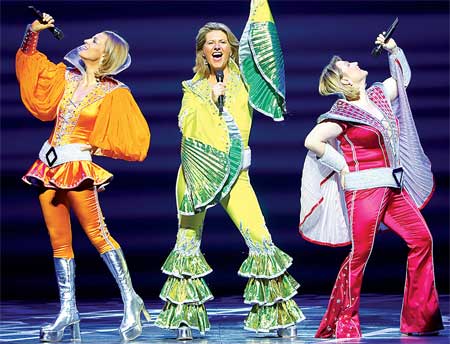MAMMA MIA! in Chinese!
After more than six months in the pipeline, China Arts and Entertainment Group (CAEG) has signed a licensing agreement with UK's Littlestar to produce a Chinese version of smash-hit musical MAMMA MIA!, marking a significant milestone for the development of musicals in China.
|
Performers on stage in MAMMA MIA! [Global Times] |
"After almost 100 years, the musical industry in the West has grown into maturity with professional production and management. The license agreement of MAMMA MIA! will enable us to learn from international experience, avoid unnecessary difficulties and it's a new path for cultivating domestic musical talents for the musical theater industry in China," said Li Xiaolei, vice director of the Department of Cultural Industries with the Ministry of Culture.
Behind the project is CAEG's dream of promoting the musical theater industry in China and in the long run, eventually creating original Chinese musicals.
As one of the most successful musicals in the world, MAMMA MIA! has been seen by more than 42 million people in over 240 cities. Based on ABBA's timeless songs, in 1999 British producer Judy Craymer collaborated with writer Catherine Johnson to create a story of family and friendship unfolding on a Greek island.
"For the past years, I have been very lucky to work in many different countries with MAMMA MIA!. In every case, I was always amazed and pleased by the simple story which is able to transcend cultural boundaries, speaks to peoples' hearts, whatever nationality," said Paul Garrington, director of the UK's MAMMA MIA!. "After all, the theme of MAMMA MIA! is universal: family conflicts, friendship and the idea of healing the wounds of the past. All of these things make MAMMA MIA! a very human, very successful story."
"We do have a great start with MAMMA MIA! for our own musical industry dream. Why we chose it, to be frank, is because of its success," commented Zhang Yu, general manager of CAEG.
Executive producer Andrew Treagus said that the musical stays close to the original version, even after translation. "In little details, it has to be changed, when the translation has been done, you know something may not work. Something like a joke, which in China, wouldn't work, it has to put into something that Chinese think is funny."
 0
0 







